How to start a glamping business
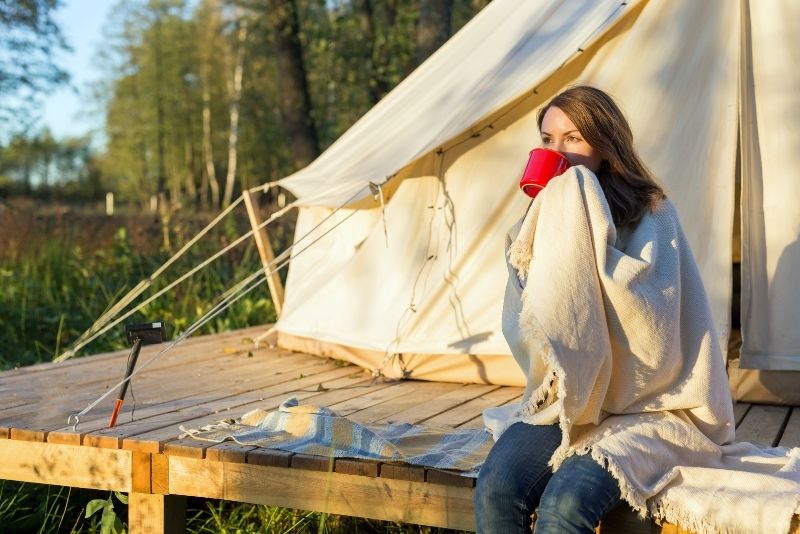
Whether it’s an escape-to-the-country lifestyle, career inspiration following your recent staycation, a practical business pivot, or even a side gig, glamping appeals to all walks of life for a host of different reasons.
We spoke to two glamping business owners about their experiences – from council approvals and going eco-friendly, to how to differentiate yourself in a growing glamping industry.
The search for a ‘better life’
Campwell Farm is a holistic, eco-friendly glamping retreat located on the edge of Winsley, near Bath. Tim Bowles, the hands-on owner of the retreat, is a 5th generation on the farm, with a background in advertising. With a love of adventure, including a stint in Hong Kong, what made Tim consider glamping as his next move?
“At a young age, I enjoyed travel and adventure – I loved being outdoors – and I grew up around the hospitality business and farming industry. When I got older, and realised I had to get serious about adult life, the idea of running a glamping retreat really connected with me.
Tim (left) with the team at Campwell Farm
“Even as I worked in Hong Kong, I kept an eye on the glamping market in the UK and built my savings while I was abroad. I headed back home in search of a better life and spent all my savings on setting up the business.
“I was advised by a consultant to ‘set up small’ before investing in planning as we didn’t know if the business was going to work. So, I started with three bell tents and made our own toilet and shower facilities by converting garden sheds. In the beginning, it was a case of watching tutorials on YouTube, honing the skills, and following common sense.
“The initial spend was around £20,000 in 2013. This has grown to hundreds of thousands of pounds over the years as we reinvested in the business from developing facilities, and tracks through the woodland to cool, comfortable spaces. We now have 7 bell tents in addition to a large yurt, plus a new cabin named after my Great Great Grandfather Abel who previously worked the land.”
“We also have to make sure that we’re insured year-round, from tents to the items that we put into the tents, whether they are in use, or in storage. And we also insure a number of activities, like sheep herding, which our guests enjoy doing.”
How easy is it to go carbon-neural?
“We knew early on that we were going to be ‘off-grid’, the nature of the site lent itself to it – and I strongly believe in looking after our planet. We had to look at making our own compost loos (which can be tricky to work with!), and we had to learn to recycle everything to reduce our impact.
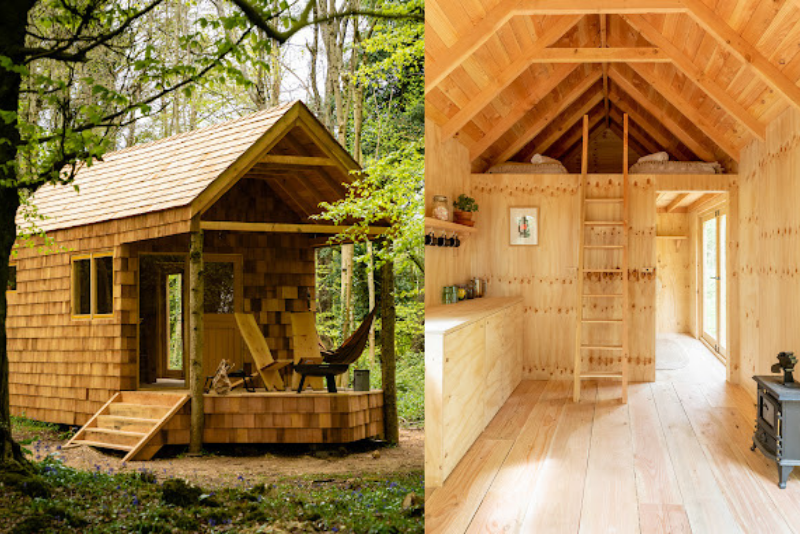
“It took years to learn how to navigate solar effectively, made easier when I found a solar electrician specialist! If you are considering setting up your own off-grid site, a solar specialist is a worthwhile investment, especially one that lives in a canal boat or off grid location!
“Now, we have hot showers, luxury compost loos, and even a solar fridge freezer, but this isn’t mainstream, and it takes a long time to build up the knowledge. We also plant a tree with every booking, and joined the ‘1% For The Planet network, supporting environmental nonprofits.”
What is the hardest part of running a glamping site?
“The physical part of being off-grid is challenging, but I have learned to deal with that over the years. Running your own small business is great challenge in itself, you have to expect a level of stress.
“We had problems with the initial planning, which took two and a half years and numerous applications to get to where we are now and was very stressful. We understand why it’s there, but there needs to be a far more modern approach moving forward.”
What advice would you give to someone interested in setting up a glamping business?
“Talk to experts. I spoke to many people, from insurers, to a friend’s mum who ran an established glamping site in Scotland, to our solar specialist, and my sister’s friend who worked in branding in London. Although I come from an advertising background myself, she worked with me to create my branding, which I felt was hugely important.”
Find out more about Tim and Campwell Farm via their website, Instagram, Facebook
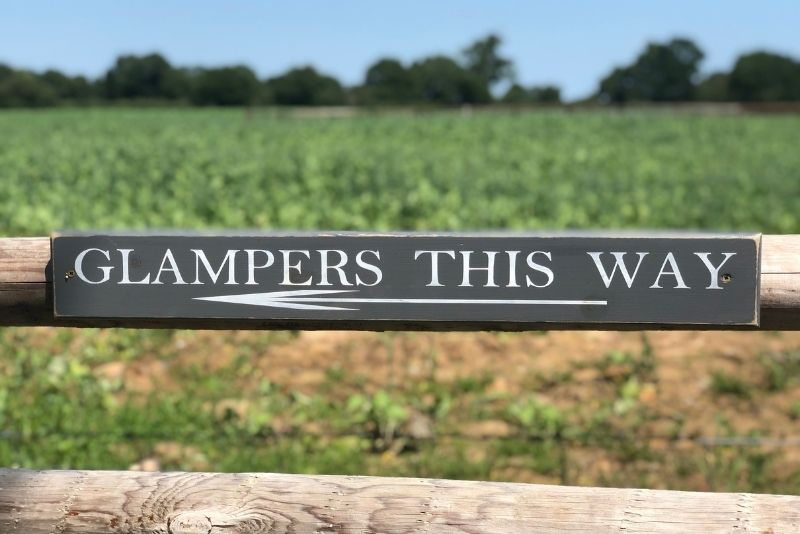
Glamping as a second income stream
Wixoldbury Farm is a located in Wickwar, a beautiful village on the edge of the Cotswolds.
Simon Graham works in the fertilizer industry and has been farming ’ for 34 years, while Jane Graham comes from a legal background. After buying a farm ten years ago, and wanting a change of pace, with a ‘we can do this’ attitude, Jane and Simon went about trying something new: glamping. What they didn’t anticipate was opening at the height of the pandemic, in July 2020.
Why glamping?
“We wanted to do something else with our land and in 2016, we started to research glamping. In 2017 we started the groundwork. We used our savings, income – and the sale of a flock of 900 sheep – to finance the project. We just felt it was the right move for our family. I have to say that we weren’t technical at all in terms of spreadsheets or our approach, it was more a case of ‘we have started so we will finish’!”
Where did you start?
“We used an agent to help with the planning process, which was great, and managed to obtain consent for eight glamping pods, but we felt that five pods would be a better option for the space. We then added two roundhouses, two glamping cabins, and a shepherd’s hut.
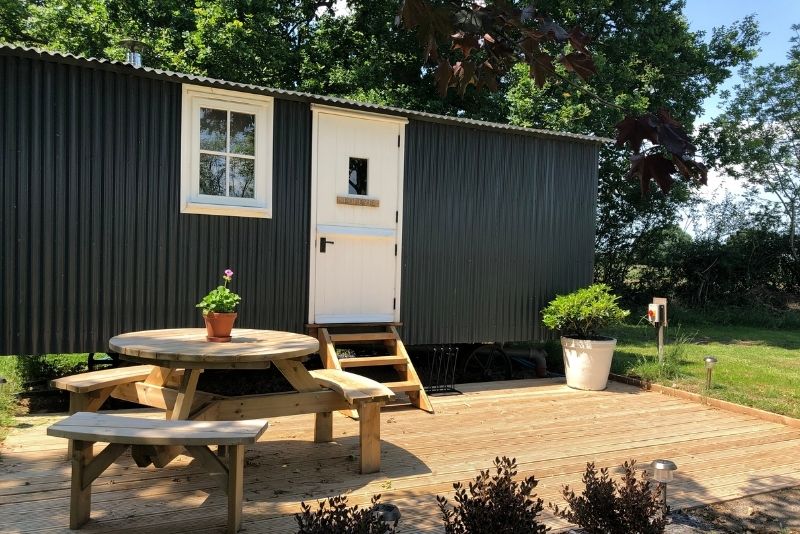
“We also insured the venture to include each pod, and we also have to carry public liability insurance. We then did all the marketing ourselves – we started with Google Business, and made sure we had a good social presence on Facebook, Instagram, and listed on HipCamp.
“The rest of it has been word of mouth with our guests recommending it to friends, and we have enjoyed our fair share of repeat visitors – some even came twice last year, and one family is returning for the third time! Recently a family booked out the entire site for a 70th birthday.”
What do you wish you’d known before you started?
“How much it was going to cost! This year, it’s nice to not have to spend and finally see money coming back into the business.
“I also wish I’d known more about structures and longevity. We have a range of different structures, some wooden and others are metal construction. Wooden structures need more upkeep and have a shorter lifespan. At the same time, people love what we have because they are so different – and we would still love to have a treehouse in the future.
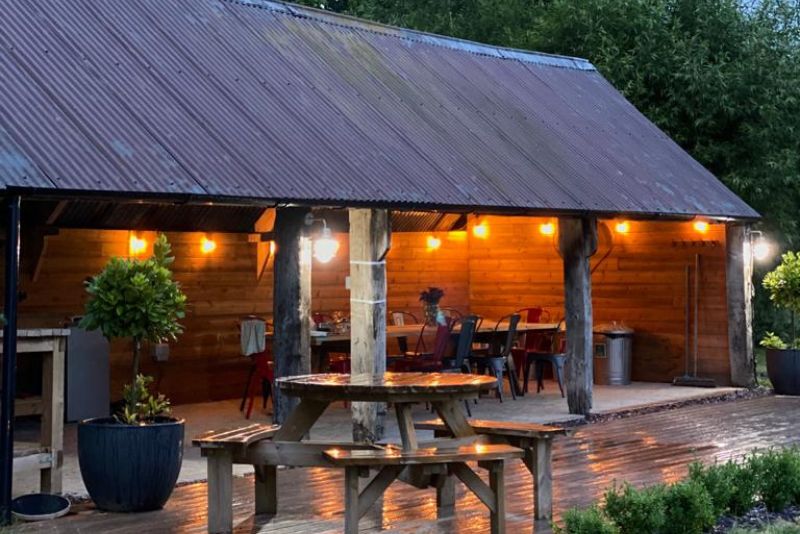
“We had planned to open in April 2020, but the pandemic hit and so this was delayed to July, once the lockdown was lifted. It’s been hectic for the last two years with opening, closing, and reopening, and adjusting to how much work is involved.
“It’s also worth clarifying that running a glamping site is a business, and hard work, not just a summer scheme. We still do the mowing and maintenance ourselves, but we have a cleaning team to help although I do have sign off on all the checks. We greet all of our guests and are on call all the time, unless we block our diary out. Our glamping site is very much part of our lives now but an enjoyable part of our lives.”
What keeps people coming back?
“Our glampers love the animals. Simon still has cows and sheep, we may add pigs and it would be nice to have a couple of rescue donkeys in the future. Our guests really enjoy bottle feeding the calves. It’s a great way for people to interact with nature, especially now that we can all get out and enjoy it again”.
Find out more about Wixoldbury Farm Glamping via their website, Instagram, and Facebook
Starting a new business venture?
Setting up a new business is never an easy feat and can take years of planning and investment to come to fruition – and glamping is no different. Whether your business needs a warehouse, or you need to source a plot of land, it can be a real challenge to get to the point where you’re ready to welcome guests, clients or customers.
If you are considering setting up a new business whether as your sole source of income or as a second job, whether for lifestyle or extra income, talk to us. We have a dedicated business team who would be happy to offer you insights into what you would need to consider in terms of insuring your new business.
We also have over 100 high street branches with a community noticeboards in each, to help you spread the word in your area. Get in touch, we’re here to help.







